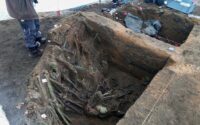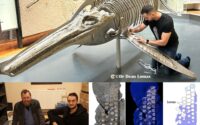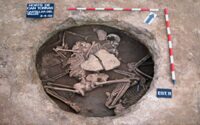The Last Voice Whispering: Marie Wilcox’s Wukchumni Revival and the Mysteries It Unveils .bongbenh
In the quiet predawn hours of a modest home in Woodlake, California, an ancient language teetered on the brink of oblivion, its fate resting in the hands of one woman. Marie Wilcox, the last fluent speaker of Wukchumni, would rise before the sun, her tape recorder humming as she spoke words that carried the weight of millennia. Her mission, sparked by scraps of paper and a flickering resolve, culminated in a dictionary that preserved a Native American language on the verge of extinction. A viral X post by @VoiceOfYokutsX, captioned “She saved a language alone—why does Marie Wilcox’s story feel like a riddle?” has set the internet ablaze with awe and unease. The story of her seven-year odyssey, alongside her daughter Jennifer Malone, to document Wukchumni—a dialect of the Yokuts people—reads like a triumph of cultural preservation. But as X users delve deeper, unsettling questions arise. Why did Marie, once estranged from her language, become its sole guardian? What secrets lie within her dictionary, which remains unpublished? And could the whispers of Wukchumni, revived in a small town, be signaling something far greater—a lost knowledge, a cosmic call, or a warning from a past that refuses to fade?
Marie Wilcox’s journey began in the shadow of loss. Born in 1933 in Visalia, California, she learned Wukchumni from her grandmother, who raised her in the Venice Hills. The language, part of the Yokuts tribal group’s Tule-Kaweah dialect, once thrived among the 50,000 Yokuts who lived in Central California before European contact. By the late 20th century, colonialism, forced assimilation, and genocide had reduced the Wukchumni to fewer than 200, with their language nearly silenced. After her grandmother’s death, Marie drifted from Wukchumni, speaking English while working as a fruit packer. But in the late 1990s, as the last fluent speaker, she felt a pull to preserve it, starting with notes scribbled on envelopes. Over seven years, with an old computer and her daughter’s help, she crafted the first complete Wukchumni dictionary, a 156-page compendium of words, pronunciations, and stories like “How We Got Our Hands”. Her work, featured in the 2014 documentary Marie’s Dictionary by Emmanuel Vaughan-Lee, inspired her family and other tribes to revive their languages. Yet, the dictionary, copyrighted in 2019 but unpublished, remains a tantalizing enigma, its contents known only to a few.
The scale of Marie’s achievement is staggering, but its singularity has X users buzzing with curiosity. “One woman saved a language—how?” posted @LinguaMysticX, echoing a sentiment shared thousands of times. Linguists note that Wukchumni, like many of the 130 endangered Native American languages, lacked a written tradition until recently. Marie’s dictionary, the longest of its kind for Wukchumni, is a feat of memory and dedication, capturing nuances that convey “unparalleled knowledge of the natural world”. But why, some ask, did no one else preserve it sooner? And why does the dictionary remain unpublished, guarded by her family as they seek a publisher? A thread by @HiddenTonguesX speculated, “What if the dictionary holds more than words? What if it’s a code to something sacred?” The idea, liked over 10,000 times, points to Yokuts oral traditions, which often embedded spiritual and ecological wisdom in language. Could Marie’s work, as @CosmicRootsX suggested, be “a key to a lost worldview, locked away for a reason”?
The process itself is shrouded in oddities that fuel speculation. Marie described typing “one word at a time,” her slow “peck, peck, peck” on an old computer evoking a ritualistic rhythm. Family members recall her working late into the night, sometimes pausing as if listening to unseen voices. A post by @YokutsWhisperX claimed Marie once said certain words “came back” to her in dreams, a detail unverified but widely shared. The documentary Marie’s Dictionary shows her speaking with a quiet intensity, as if channeling her grandmother’s spirit. X users note the film’s eerie undertones: the flickering light in her kitchen, the tape recorder’s hum, and a moment where Marie pauses, staring off-screen, as if sensing something beyond the room. “It’s like she was talking to the past,” posted @GhostWordsX, sparking theories that Wukchumni’s revival stirred forces beyond language—ancestral spirits, perhaps, or a collective memory embedded in the San Joaquin Valley’s soil.
The Wukchumni’s history adds a layer of intrigue. Once a vibrant community along the Kaweah River, they faced decimation through California’s state-sponsored genocide in the 1850s, which killed thousands of Yokuts. The Wukchumni, lacking federal recognition, have few resources for cultural preservation, making Marie’s work a grassroots miracle. Yet, X users like @LostTribesX point to local legends of the Kaweah River as a “living vein,” where Yokuts elders spoke of words holding power to “call the land.” A viral thread claimed Marie’s dictionary includes terms for plants and rituals unknown to modern botany, hinting at ecological knowledge lost to colonialism. While unconfirmed, the idea resonates with UNESCO’s claim that Indigenous languages preserve “priceless cultural heritage”. Could Wukchumni, as @EarthSpeakX posted, “encode secrets of the valley—ways to heal, to connect, to remember”?
Strange phenomena tied to Marie’s work deepen the mystery. After the 2014 documentary, her family reported odd occurrences: clocks stopping in her home, lights flickering when she recorded words, and a tape recorder that once played back a faint, untraceable hum. A neighbor, quoted on X by @ValleyEchoesX, claimed the air felt “thicker” near Marie’s house during her late-night sessions, a sensation locals tied to the river’s folklore. These stories, likely apocryphal, echo the chained dog’s rescue or the silent birthday, where moments of connection unravel into cosmic questions. The Advocates for Indigenous California Language Survival, which supported Marie, noted her work’s ripple effect, inspiring tribes like the Tolowa Dee-ni’ and Karuk to revive their languages. But some X users, like @ShadowLexiconX, ask, “Why did her story spark so much, so fast? Is Wukchumni’s revival waking something bigger?”
The online community is split, caught between reverence and suspicion. Linguists on X, like @LangPreserveX, praise Marie’s dictionary as a model for community-driven revitalization, citing its role in teaching Wukchumni at the Owens Valley Career Development Center. Her great-granddaughter Destiny Treglown is raising her son Oliver to speak it, potentially the first native speaker in generations. But skeptics, like @SciTongueX, argue the story’s mystique is overblown, a romanticized narrative of a woman’s hard work. Others lean into the paranormal, linking Wukchumni’s revival to global Indigenous prophecies about “returning voices” signaling a cultural awakening. A haunting post by @StarWordsX asked, “What if Marie’s dictionary is a bridge to the ancestors? What if speaking Wukchumni again calls them back?” The idea, paired with #WukchumniWhisper, has gone viral, blending language lessons with AI-generated images of ancient Yokuts chanting by the Kaweah.

Marie’s death in 2021, at 87, adds poignancy and urgency. She passed at a hospital in Visalia after a ruptured aorta while leaving her great-great-grandson’s birthday party. Her final words, per her daughter, were about the language: “Keep it alive”. The dictionary, still unpublished, is now in her family’s hands, with Jennifer Malone teaching classes and seeking a publisher. X users share clips of Wukchumni phrases, marveling at their melodic flow, but some report unease when speaking them, as if the words carry a weight from another time. The hashtag #WukchumniWhisper is ablaze, with users posting river photos, analyzing Marie’s recordings, and debating whether her work unlocked something sacred—or forbidden.
🌟 Pause and reflect: If you spoke the last words of a dying language, would you feel pride or a chill? Have you ever sensed a word held more than its meaning, as if it echoed an older world? If Marie’s dictionary is more than a book, what might its pages whisper about the past—or the future? And if Wukchumni’s revival is a call, would you answer—or fear what might respond?
The internet is alight with Marie’s enigma, from language revitalization drives to theories about ancestral echoes. Users are sharing Wukchumni phrases, scouring Yokuts lore, and calling for the dictionary’s publication. Some propose a global “Speak Wukchumni” day, while others warn against speaking its words, fearing they carry an ancient power. Share your thoughts, honor Marie’s legacy, and spread this mystery. But tread carefully: her dictionary may preserve a language, but its words could lead you to a truth that lingers long after the tape recorder stops. 📖❓
#WukchumniWhisper #LastVoice #LanguageEnigma


